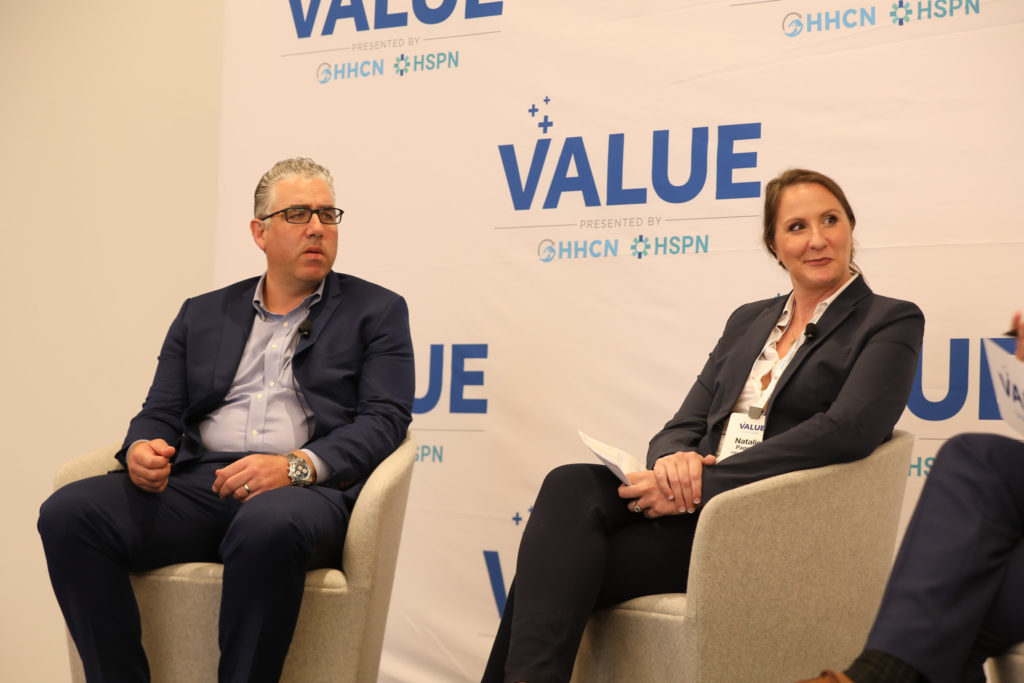As more home health providers move into the value-based care space, these organizations are engaging on multiple fronts in order to ensure success.
Providers such as VNA Health Group and AccentCare Inc., in particular, exemplify the moves companies are making to support their value-based care strategies.
In its broadest definition, value-based care means outcomes over costs.
At AccentCare, embracing a wider view of value-based care has become increasingly important, Dr. Natalie Pagoria, CMO of Home Health and Innovations at AccentCare, said during a panel discussion at Home Health Care News’ VALUE event this month.
“I like to think of it in a more holistic setting — that’s some of my family medicine training coming out. Really looking at outcomes but with some modifiers, per se, for clinical quality, and excellence and experience, from the patient side, our clinician side, our employee side, as well and from our family side,” Pagoria said. “[Plus], really looking at the total cost of care beyond that short period of time that we’re their caregiver.”
AccentCare is a Dallas-based provider of home health, hospice and personal care services, as well as private-duty nursing and care management services. The company has more than 270 locations across 32 states.
On its end, VNA Health Group is engaging with value-based care through a number of different avenues.
“As a home health agency, I think there’s a few places where we’ve been able to be successful,” Dr. Steve Landers, CEO of VNA Health Group, said during the discussion. “A very important component — a very important utility within our health system partners, bundled payments, accountable care and risk models – [that] we’ve focused on is how to make sure that we align what we do in a way that supports their value-based initiatives.”
Holmdel, New Jersey-based VNA Health Group is one of the largest independent, nonprofit providers of home-based health services in New Jersey and Ohio.
“[We] spend a lot of time thinking about, ‘How do we do that in a way where we don’t get ‘used and abused,’” Landers continued, noting that home health providers are sometimes viewed as a “kind of a widget” other than a valued partner.
When it comes to value-based care, VNA Health Group also has a contract for virtual-only home care services with a managed care plan.
At first glance, value-based care only makes up a small portion of the company’s business. But that doesn’t paint the full picture, the CEO explained.
“In terms of revenues from some type of bonus payment or cap payment, [it’s] less than 1%,” Landers said. “In terms of activities that are organized under some broader construct, either through a Primary Cares First, or through our health system partners’ risk contracts, or through bundled payment contracts, it’s probably 70% of what’s happening.”
Pagoria pointed out that AccentCare has been involved with value-based care in some form or fashion since the beginning.
“We’ve been really engaged in value-based arrangements … since the beginning of the organization,” she said. “Whether it’s [Bundled Payments for Care Improvement] and getting involved in that really early, shared-savings programs, ACOs.”
While value-based care arrangements only make up roughly 7% to 10% of AccentCare’s book of business, Pagoria stressed that value is top of mind throughout the organization.
In terms of value-based care ROI, there is one area that stands out to providers.
“Palliative care certainly takes into account the highest utilizers, the most vulnerable patients in our population,” Pagoria said. “Being able to provide in-home services can absolutely reduce the overall cost of care.”
As far as seeing an industry-wide shift to value-based care, Landers thinks the Patient-Driven Groupings Model (PDGM) was a good start.
“I think that really creates a more value-oriented fee-for-service system,” he said.




